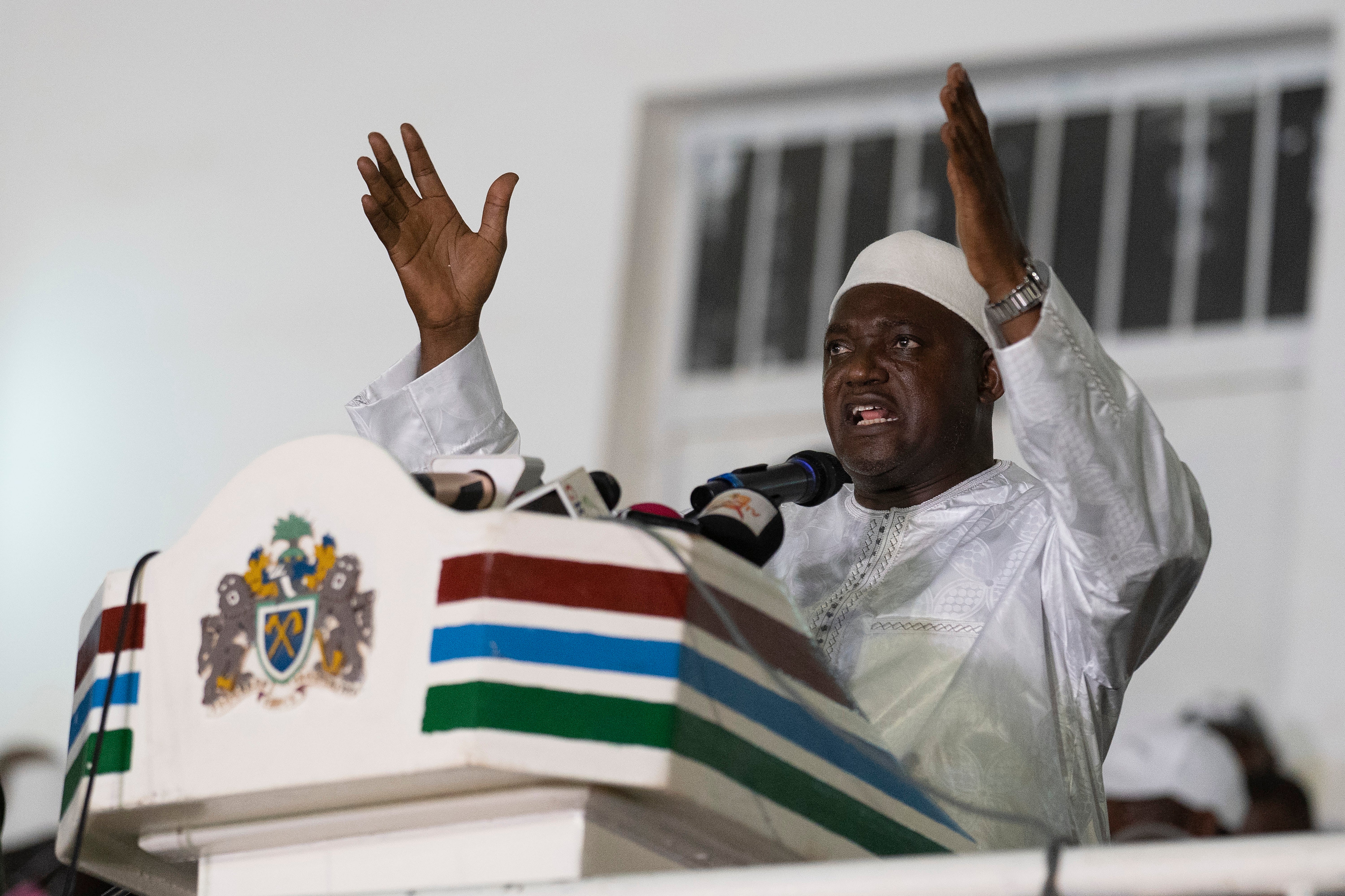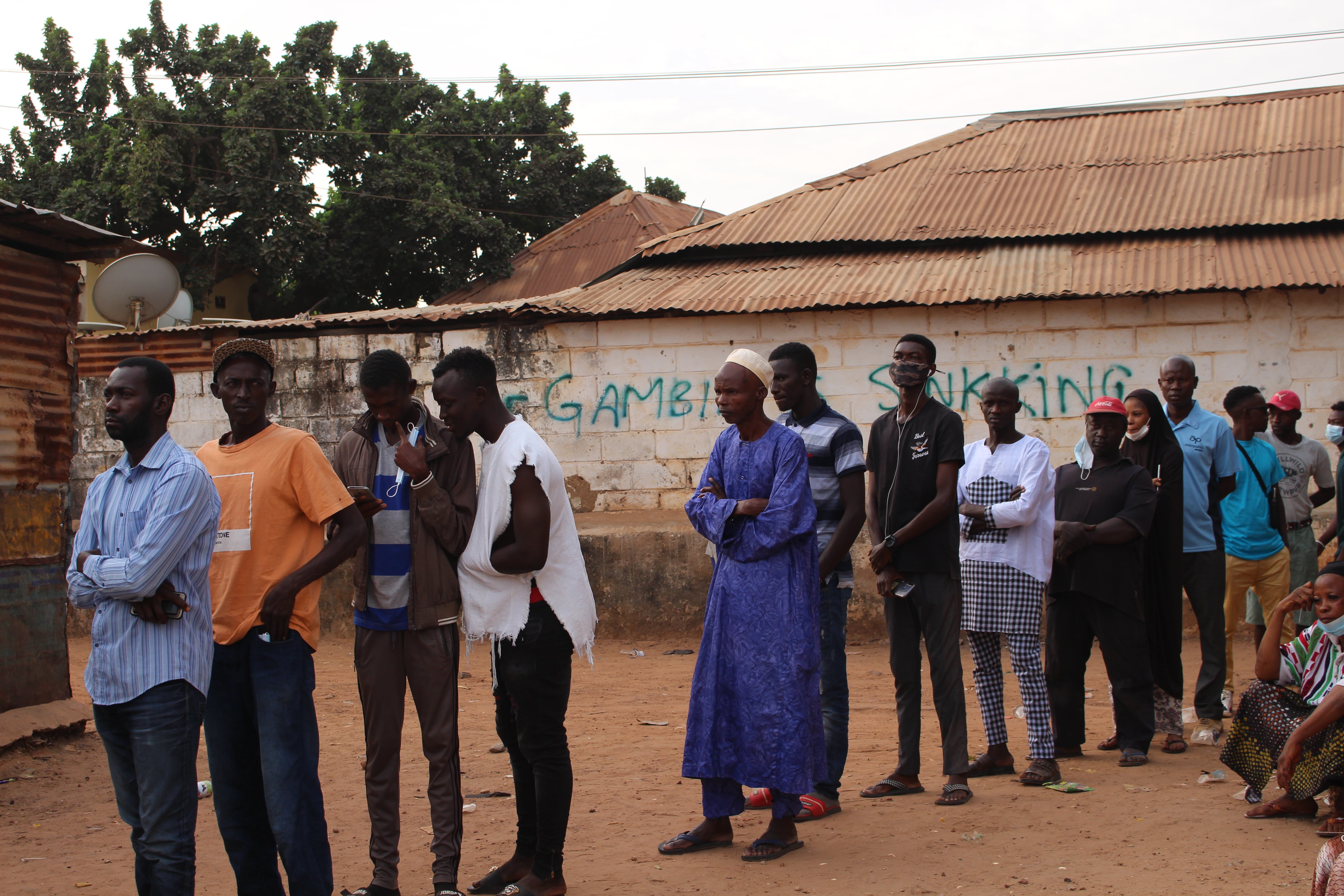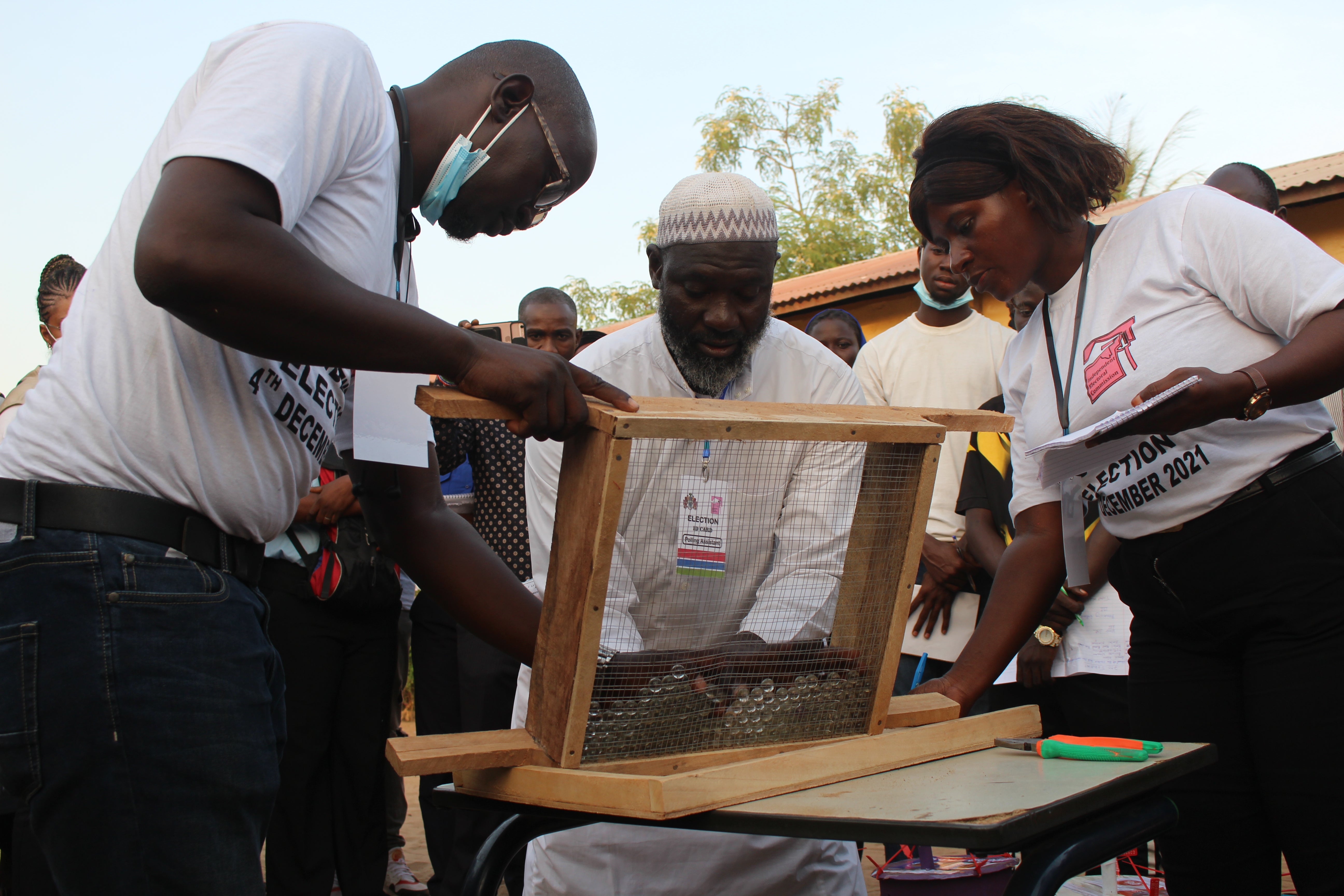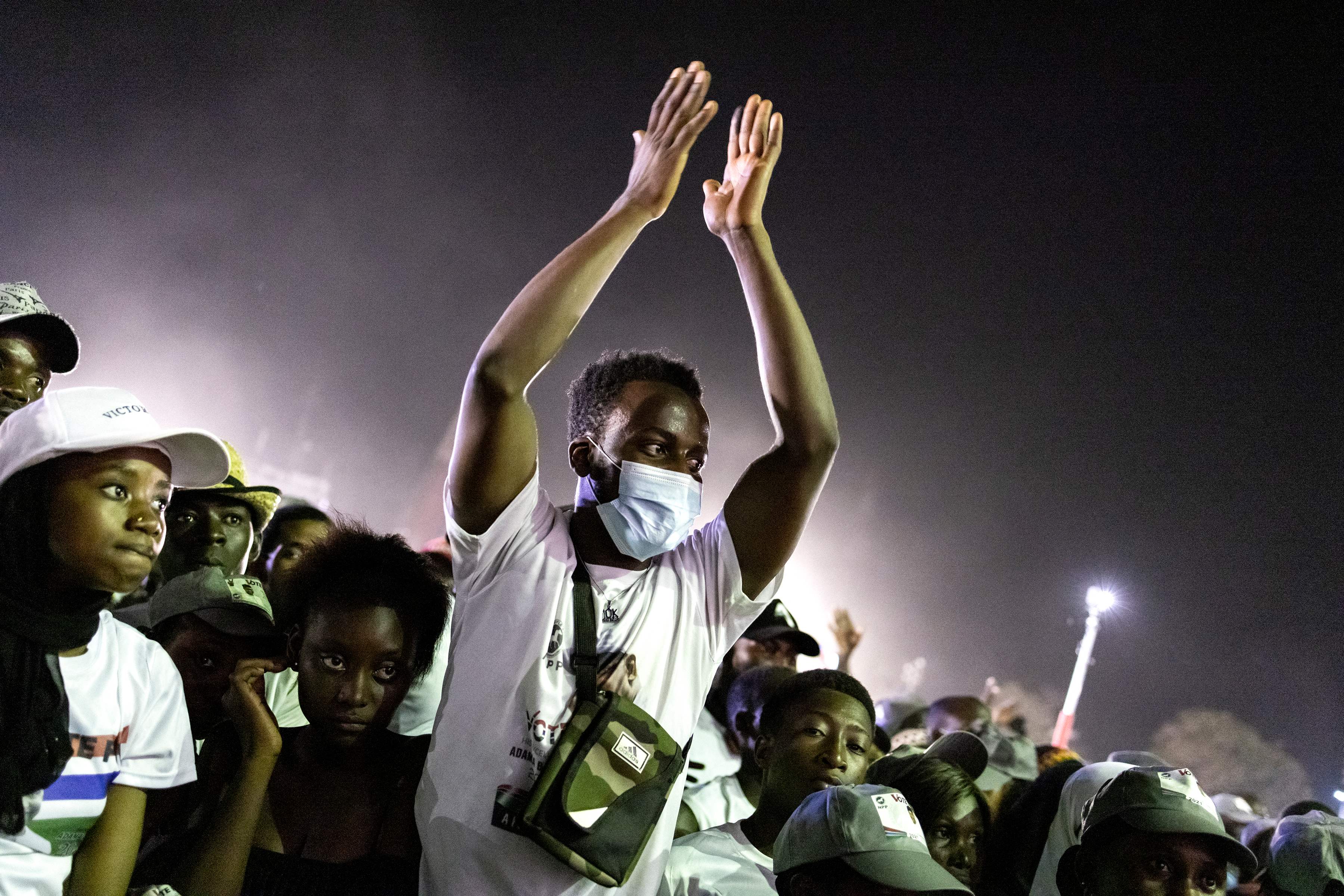Long road ahead: The Gambia’s re-elected president faces pressure to deliver on democracy
Promised reforms on issues including term limits will be closely scrutinised as the country plots a new path after decades under dictatorship, Portia Crowe reports from Banjul


Two days after being declared winner in this month’s election in the Gambia, the newly re-elected president, Adama Barrow, told the country that he would serve “for all Gambians”.
“I don’t think there is a loser – we are all winners because it is the Gambia that is important,” Mr Barrow, a former property developer and one-time Argos security guard in London who was thrust into Gambian politics just five years ago, said at a press conference last week.
However, the 56-year-old has a task on his hands as he seeks to deliver on promised constitutional and electoral reforms and bring justice for abuses under the former despotic ruler Yahya Jammeh, all against a backdrop of political tensions and suspicion about his commitment to democracy.
Mr Barrow won the 4 December election with 53 per cent of the vote under the current simple-majority system. Some opposition candidates have rejected the results and small protests broke out in the capital, Banjul, but observers said the election was conducted fairly.
The election was closely watched as a key test of the west African nation’s democratic transition and stability, and was the first held without Mr Jammeh in almost three decades.
The Gambia, a sliver of a country that is almost entirely surrounded by Senegal and is home to just 2.4 million people, is a former British colony that has long been a popular tourist hotspot.
It was ruled tightly for 22 years by Mr Jammeh, a brutal leader accused of corruption and widespread human rights violations, including extrajudicial killings, rape, witch hunts, and harmful “treatments” for people living with HIV/Aids.
After Mr Jammeh’s ousting and eventual exile to Equatorial Guinea in 2017, Mr Barrow came to power with the backing of seven political parties as an independent candidate on a transitional agreement plan that he should only serve three years.
While Mr Barrow won initial praise for setting a democratic process in motion, his refusal to step down in late 2019 and a decision to strike a deal with his predecessor’s party has alarmed critics who say he is putting politics over reforms and tightening his grip on power.
Analysts say the president will be under pressure during his second term – which officially starts in January – to deliver on promises to rewrite the country’s constitution, pass a new electoral law, and secure justice through a commission for victims of abuse under the previous regime.

Sait Matty Jaw, the executive director of the Centre for Research and Policy Development, an independent Gambia non-profit organisation, said reforming the constitution, which came into effect in 1997 under Mr Jammeh and does not include term limits, should be a top priority for Mr Barrow.
“Only a constitution can help consolidate some of the democratic progress that we’ve made so far, especially when it comes to the issue around electoral reforms,” Mr Jaw told The Independent.
After a two-year review process, a draft new constitution including electoral reforms such as term limits was rejected by parliament in September 2020.
In his post-election press conference last week, Mr Barrow said he would impose a two-term limit and restructure the polling process to move away from the simple majority system and include potential runoff polls if no candidate wins 50% of the votes.
However, Mr Barrow did not specify whether the term limits would be retroactive, as in the version voted down last year, which would block him from resetting his term count and running again in 2026. He also did not say if the constitution would allow him to seek further terms in the future.
The president may need to wait until parliamentary elections – expected in April – to be able to enact change. His National People’s Party (NPP) has little representation or sway in the national assembly, as he only set it up in 2019 after breaking away from the United Democratic Party (UDP).
It looks like a significant foot forward in the march towards democracy
Another issue that civil society groups would like to see prioritised is justice for Mr Jammeh’s victims. In October 2018, Mr Barrow launched the Truth, Reconciliation, and Reparations Commission to investigate the former regime’s crimes, but the final report was delayed several times and only tabled days ahead of the election.
Though it has not yet been made public, the commission’s chair said in a statement it had “identified and recommended for prosecution those most responsible for gross human rights violations.” Mr Jammeh is expected to be chief among those named.
However, Nana-Jo N’dow, a campaigner who founded the African Network Against Extrajudicial Killings and Enforced Disappearances after her father disappeared in 2013, is sceptical of Mr Barrow’s commitment to prosecuting the ex-president.
In September, he made a deal with Mr Jammeh’s former Alliance for Patriotic Reorientation and Construction Party, officially to promote national reconciliation, although analysts say it was a strategic move to broaden his supporter base.
“Speaking from the perspective of the victims, it’s just very disheartening,” Ms N’dow said.
Pa Louis Sambou, a fellow with the pro-democracy and rule-of-law advocacy group Democracy Watch Gambia, said that if Mr Barrow dominates the national assembly, as Mr Jammeh did, there would be a risk that he could implement measures and legislation that could threaten democracy, free speech and the rule of law.
“I wouldn’t class him as a tyrant,” said Mr Sambou.
“It’s difficult but I wouldn’t class Barrow as a democrat, either,” he added, saying that he would take the president’s recent vow on term limits with “a pinch of salt”.

Ms N’dow said she was also worried that the president could follow the example of other west African leaders who have in recent years rewritten constitutions to remain in power, such as Alassane Ouattara in Ivory Coast, Alpha Conde in Guinea, and Faure Gnassingbe in Togo.
“They’ve changed the game,” she said. “They understand that your image is everything, so they overstay their welcome, not by brute force but by changing the constitution.”
Seedy Njie, a deputy spokesperson for Mr Barrow’s NPP, did not respond to requests for comment.
Despite their criticisms and concerns, Mr Sambou said it was too early to make firm judgements about Mr Barrow, while Ms N’dow described the election as a “historic moment” for the country.
African Union election observers said it was conducted in line with international standards, and the European Union praised the transparency of the voting and counting process.
However, Mr Barrow’s main opponent and former mentor Ousainou Darboe, who rejected the preliminary result on 5 December, launched a legal challenge to the election on Monday.
The day after the election, Mr Darboe and two other candidates said they did not accept the results because the vote count took longer than expected, and because of alleged problems at polling stations. The UDP leader has not to date provided any proof of wrongdoing.
The grounds for the legal challenge are unknown, and the Supreme Court will fix a date to hear the case.

While election day itself was peaceful and turnout high at polling stations, the EU did raise concerns about campaign tactics in the lead-up to the vote. Its mission said it had directly observed the distribution of goods and misuse of state resources at rallies held by the ruling party, while WhatsApp was used to spread “disinformation” and “tribal rhetoric”.
Mr Barrow ended up winning 45 of 53 constituencies, including many UDP strongholds, suggesting that his popularity cut across ethnic, religious and political lines. Many NPP voters pointed to roads and infrastructure that had been built over the last five years to explain their support.
Raymond Esebagbon, resident director of the National Democratic Institute, a Washington-based nonprofit that works to support democratic institutions around the world, said the Gambia was a democracy in transition but that the vote was a milestone and a “good sign” despite the hiccups.
“It looks like a significant foot forward in the march towards democracy,” he said.
For Fatoumatta Ceesay, a 42-year-old mother from the eastern town of Basse, Mr Barrow’s time in power has changed her life.
“Now I am free – I talk free, I eat free, I sleep free,” she said. “We have peace.”






Join our commenting forum
Join thought-provoking conversations, follow other Independent readers and see their replies
Comments